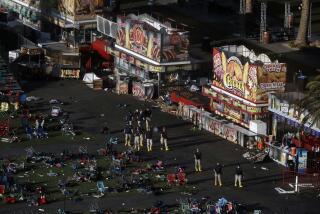President Orders Further Restrictions on How Foreigners in U.S. Can Buy Guns
WASHINGTON — In the wake of the recent shooting rampage atop the Empire State Building, President Clinton on Wednesday ordered new restrictions affecting gun purchases by foreigners in the United States.
He also announced a new requirement for child-safety locks on handguns issued to federal law enforcement officers and renewed his request for legislation banning armor-piercing, or “cop-killer,” bullets such as those used during a wild, daytime robbery attempt Feb. 28 in North Hollywood that left 17 injured and the two gunmen dead.
“Easy access means deadly consequences,” Clinton said in an Oval Office ceremony at which he was joined by uniformed police, Democratic legislators and James S. Brady, the former press secretary for Ronald Reagan who was seriously wounded during an assassination attempt on the then-president.
The major new element in Clinton’s firearms policy was a requirement that foreigners provide documentation that they have been residents for 90 days, as well as photo identification, a move prompted by last month’s rampage in New York City in which a Palestinian killed one sightseer and wounded six others before taking his own life.
“We were all shocked,” Clinton said Wednesday, recounting how the man had been living on a tourist visa in a Florida motel for three weeks before purchasing a handgun.
Under Clinton’s order, the Treasury Department would amend applications for firearm sales so that gun buyers will have to attest that they live in the state of purchase. Although foreigners already face a 90-day residency requirement, Clinton’s order would mandate proof through documentation.
The president’s moves on the gun control front, following the much-publicized acts of violence in the nation’s two largest cities, prompted some immediate statements of support.
“It’s definitely a step in the right direction,” said Holly Richardson, spokeswoman for Handgun Control Inc., the nation’s largest citizens gun control lobby. “We need to restrict the ease that guns can be purchased by people who are not residents of the state.”
Some groups, however, were less than delighted at the notion of singling out immigrants for special identification rules.
“The issue is that these restrictions should apply to everyone,” declared Lisa Navarrete, a spokeswoman for the National Council of La Raza, a major advocacy group for Latinos in Washington. “We wish Clinton wouldn’t have restricted this measure to only foreign-born people.”
Others, including opponents of gun-control measures, viewed Clinton’s focus on firearm issues more skeptically and accused the White House of seeking to distract the public from news of Democratic fund-raising practices.
“This is not about Smith & Wesson. This is about Lippo Group,” declared the National Rifle Assn., alluding to the Indonesia-based conglomerate that has been linked to improper donations to the Democratic Party.
The administration denied that the announcements were designed to counter media attention to a range of Democratic Party fund-raising controversies.
“That would be impossible,” said Mike McCurry, the White House press secretary.
During the White House ceremony, Clinton was asked about the North Hollywood shootout in which Los Angeles police were clearly outgunned by the two robbers, who were armed with automatic rifles. The president said he believed that existing laws, such as an assault weapons ban, offered ways “to deal with that.”
Times staff writer Greg E. Norman contributed to this story.
More to Read
Sign up for Essential California
The most important California stories and recommendations in your inbox every morning.
You may occasionally receive promotional content from the Los Angeles Times.










